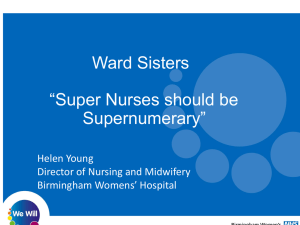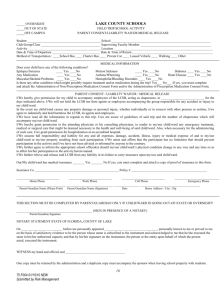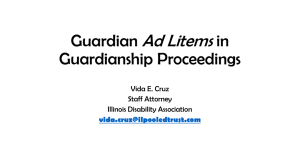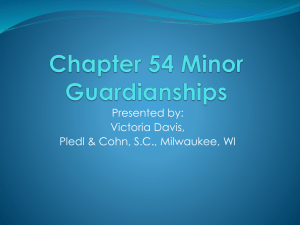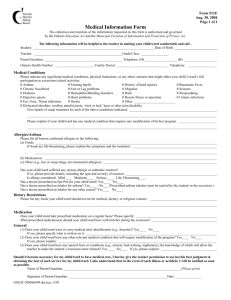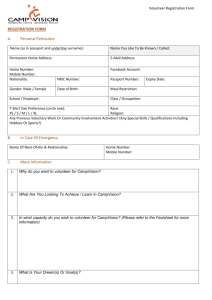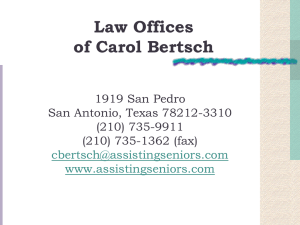HB39-SAA - Texas Legislature Online
advertisement
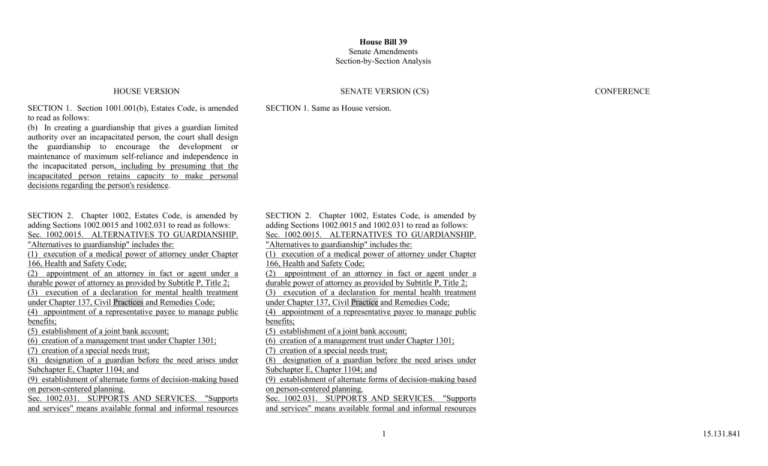
House Bill 39 Senate Amendments Section-by-Section Analysis HOUSE VERSION SENATE VERSION (CS) SECTION 1. Section 1001.001(b), Estates Code, is amended to read as follows: (b) In creating a guardianship that gives a guardian limited authority over an incapacitated person, the court shall design the guardianship to encourage the development or maintenance of maximum self-reliance and independence in the incapacitated person, including by presuming that the incapacitated person retains capacity to make personal decisions regarding the person's residence. SECTION 1. Same as House version. SECTION 2. Chapter 1002, Estates Code, is amended by adding Sections 1002.0015 and 1002.031 to read as follows: Sec. 1002.0015. ALTERNATIVES TO GUARDIANSHIP. "Alternatives to guardianship" includes the: (1) execution of a medical power of attorney under Chapter 166, Health and Safety Code; (2) appointment of an attorney in fact or agent under a durable power of attorney as provided by Subtitle P, Title 2; (3) execution of a declaration for mental health treatment under Chapter 137, Civil Practices and Remedies Code; (4) appointment of a representative payee to manage public benefits; (5) establishment of a joint bank account; (6) creation of a management trust under Chapter 1301; (7) creation of a special needs trust; (8) designation of a guardian before the need arises under Subchapter E, Chapter 1104; and (9) establishment of alternate forms of decision-making based on person-centered planning. Sec. 1002.031. SUPPORTS AND SERVICES. "Supports and services" means available formal and informal resources SECTION 2. Chapter 1002, Estates Code, is amended by adding Sections 1002.0015 and 1002.031 to read as follows: Sec. 1002.0015. ALTERNATIVES TO GUARDIANSHIP. "Alternatives to guardianship" includes the: (1) execution of a medical power of attorney under Chapter 166, Health and Safety Code; (2) appointment of an attorney in fact or agent under a durable power of attorney as provided by Subtitle P, Title 2; (3) execution of a declaration for mental health treatment under Chapter 137, Civil Practice and Remedies Code; (4) appointment of a representative payee to manage public benefits; (5) establishment of a joint bank account; (6) creation of a management trust under Chapter 1301; (7) creation of a special needs trust; (8) designation of a guardian before the need arises under Subchapter E, Chapter 1104; and (9) establishment of alternate forms of decision-making based on person-centered planning. Sec. 1002.031. SUPPORTS AND SERVICES. "Supports and services" means available formal and informal resources 1 CONFERENCE 15.131.841 House Bill 39 Senate Amendments Section-by-Section Analysis HOUSE VERSION SENATE VERSION (CS) and assistance that enable an individual to: (1) meet the individual's needs for food, clothing, or shelter; (2) care for the individual's physical or mental health; (3) manage the individual's financial affairs; or (4) make personal decisions regarding residence, voting, operating a motor vehicle, and marriage. and assistance that enable an individual to: (1) meet the individual's needs for food, clothing, or shelter; (2) care for the individual's physical or mental health; (3) manage the individual's financial affairs; or (4) make personal decisions regarding residence, voting, operating a motor vehicle, and marriage. SECTION 3. Section 1002.015, Estates Code, is amended to read as follows: Sec. 1002.015. GUARDIANSHIP PROCEEDING. The term "guardianship proceeding" means a matter or proceeding related to a guardianship or any other matter covered by this title, including: (1) the appointment of a guardian of a minor or other incapacitated person, including an incapacitated adult for whom another court obtained continuing, exclusive jurisdiction in a suit affecting the parent-child relationship when the person was a child; (2) an application, petition, or motion regarding guardianship or a substitute for [an alternative to] guardianship under this title; (3) a mental health action; and (4) an application, petition, or motion regarding a trust created under Chapter 1301. SECTION 3. Same as House version. SECTION 4. Section 1054.004, Estates Code, is amended by amending Subsection (a) and adding Subsection (c) to read as follows: (a) An attorney ad litem appointed under Section 1054.001 shall interview the proposed ward within a reasonable time SECTION 4. Same as House version. 2 CONFERENCE 15.131.841 House Bill 39 Senate Amendments Section-by-Section Analysis HOUSE VERSION SENATE VERSION (CS) CONFERENCE before the hearing in the proceeding for the appointment of a guardian. To the greatest extent possible, the attorney shall discuss with the proposed ward: (1) the law and facts of the case; (2) the proposed ward's legal options regarding disposition of the case; [and] (3) the grounds on which guardianship is sought; and (4) whether alternatives to guardianship would meet the needs of the proposed ward and avoid the need for the appointment of a guardian. (c) Before the hearing, the attorney ad litem shall discuss with the proposed ward the attorney ad litem's opinion regarding: (1) whether a guardianship is necessary for the proposed ward; and (2) if a guardianship is necessary, the specific powers or duties of the guardian that should be limited if the proposed ward receives supports and services. SECTION 5. Section 1054.054, Estates Code, is amended by adding Subsections (c) and (d) to read as follows: (c) The guardian ad litem shall: (1) investigate whether a guardianship is necessary for the proposed ward; and (2) evaluate alternatives to guardianship and supports and services available to the proposed ward that would avoid the need for appointment of a guardian. (d) The information gathered by the guardian ad litem under Subsection (c) is subject to examination by the court. SECTION 5. Same as House version. SECTION 6. Sections 1054.201(a) and (b), Estates Code, are SECTION 6. Same as House version. 3 15.131.841 House Bill 39 Senate Amendments Section-by-Section Analysis HOUSE VERSION SENATE VERSION (CS) CONFERENCE amended to read as follows: (a) An attorney for an applicant for guardianship and a [A] court-appointed attorney in a guardianship proceeding, including an attorney ad litem, must be certified by the State Bar of Texas, or a person or other entity designated by the state bar, as having successfully completed a course of study in guardianship law and procedure sponsored by the state bar or the state bar's designee. (b) The State Bar of Texas shall require four [three] hours of credit for certification under this subchapter, including one hour on alternatives to guardianship and supports and services available to proposed wards. SECTION 7. Section 1101.001(b), Estates Code, is amended to read as follows: (b) The application must be sworn to by the applicant and state: (1) the proposed ward's name, sex, date of birth, and address; (2) the name, relationship, and address of the person the applicant seeks to have appointed as guardian; (3) whether guardianship of the person or estate, or both, is sought; (3-a) whether alternatives to guardianship and available supports and services to avoid guardianship were considered; (3-b) whether any alternatives to guardianship and supports and services available to the proposed ward considered are feasible and would avoid the need for a guardianship; (4) the nature and degree of the alleged incapacity, the specific areas of protection and assistance requested, and the limitation or termination of rights requested to be included in the court's order of appointment, including a termination of: SECTION 7. Same as House version. 4 15.131.841 House Bill 39 Senate Amendments Section-by-Section Analysis HOUSE VERSION SENATE VERSION (CS) CONFERENCE (A) the right of a proposed ward who is 18 years of age or older to vote in a public election; [and] (B) the proposed ward's eligibility to hold or obtain a license to operate a motor vehicle under Chapter 521, Transportation Code; and (C) the right of a proposed ward to make personal decisions regarding residence; (5) the facts requiring the appointment of a guardian; (6) the interest of the applicant in the appointment of a guardian; (7) the nature and description of any kind of guardianship existing for the proposed ward in any other state; (8) the name and address of any person or institution having the care and custody of the proposed ward; (9) the approximate value and description of the proposed ward's property, including any compensation, pension, insurance, or allowance to which the proposed ward may be entitled; (10) the name and address of any person whom the applicant knows to hold a power of attorney signed by the proposed ward and a description of the type of power of attorney; (11) for a proposed ward who is a minor, the following information if known by the applicant: (A) the name of each of the proposed ward's parents and either the parent's address or that the parent is deceased; (B) the name and age of each of the proposed ward's siblings, if any, and either the sibling's address or that the sibling is deceased; and (C) if each of the proposed ward's parents and adult siblings are deceased, the names and addresses of the proposed ward's other living relatives who are related to the proposed ward within the third degree by consanguinity and who are adults; 5 15.131.841 House Bill 39 Senate Amendments Section-by-Section Analysis HOUSE VERSION SENATE VERSION (CS) CONFERENCE (12) for a proposed ward who is a minor, whether the minor was the subject of a legal or conservatorship proceeding in the preceding two years and, if so: (A) the court involved; (B) the nature of the proceeding; and (C) any final disposition of the proceeding; (13) for a proposed ward who is an adult, the following information if known by the applicant: (A) the name of the proposed ward's spouse, if any, and either the spouse's address or that the spouse is deceased; (B) the name of each of the proposed ward's parents and either the parent's address or that the parent is deceased; (C) the name and age of each of the proposed ward's siblings, if any, and either the sibling's address or that the sibling is deceased; (D) the name and age of each of the proposed ward's children, if any, and either the child's address or that the child is deceased; and (E) if there is no living spouse, parent, adult sibling, or adult child of the proposed ward, the names and addresses of the proposed ward's other living relatives who are related to the proposed ward within the third degree by consanguinity and who are adults; (14) facts showing that the court has venue of the proceeding; and (15) if applicable, that the person whom the applicant seeks to have appointed as a guardian is a private professional guardian who is certified under Subchapter C, Chapter 155, Government Code, and has complied with the requirements of Subchapter G, Chapter 1104. 6 15.131.841 House Bill 39 Senate Amendments Section-by-Section Analysis HOUSE VERSION SECTION 8. Section 1101.101, Estates Code, is amended by amending Subsection (a) and adding Subsection (c) to read as follows: (a) Before appointing a guardian for a proposed ward, the court must: (1) find by clear and convincing evidence that: (A) the proposed ward is an incapacitated person; (B) it is in the proposed ward's best interest to have the court appoint a person as the proposed ward's guardian; [and] (C) the proposed ward's rights or property will be protected by the appointment of a guardian; (D) alternatives to guardianship that would avoid the need for the appointment of a guardian have been considered and determined not to be feasible; and (E) supports and services available to the proposed ward that would avoid the need for the appointment of a guardian have been considered and determined not to be feasible; and (2) find by a preponderance of the evidence that: (A) the court has venue of the case; (B) the person to be appointed guardian is eligible to act as guardian and is entitled to appointment, or, if no eligible person entitled to appointment applies, the person appointed is a proper person to act as guardian; (C) if a guardian is appointed for a minor, the guardianship is not created for the primary purpose of enabling the minor to establish residency for enrollment in a school or school district for which the minor is not otherwise eligible for enrollment; and (D) the proposed ward: (i) is totally without capacity as provided by this title to care for himself or herself and to manage his or her property; or (ii) lacks the capacity to do some, but not all, of the tasks SENATE VERSION (CS) CONFERENCE SECTION 8. Same as House version. 7 15.131.841 House Bill 39 Senate Amendments Section-by-Section Analysis HOUSE VERSION SENATE VERSION (CS) CONFERENCE necessary to care for himself or herself or to manage his or her property. (c) A finding under Subsection (a)(2)(D)(ii) must specifically state whether the proposed ward lacks the capacity, or lacks sufficient capacity with supports and services, to make personal decisions regarding residence, voting, operating a motor vehicle, and marriage. SECTION 9. Section 1101.103(b), Estates Code, is amended to read as follows: (b) The letter or certificate must: (1) describe the nature, degree, and severity of the proposed ward's incapacity, including any functional deficits regarding the proposed ward's ability to: (A) handle business and managerial matters; (B) manage financial matters; (C) operate a motor vehicle; (D) make personal decisions regarding residence, voting, and marriage; and (E) consent to medical, dental, psychological, or psychiatric treatment; (2) in providing a description under Subdivision (1) regarding the proposed ward's ability to operate a motor vehicle and make personal decisions regarding voting, state whether in the physician's opinion the proposed ward: (A) has the mental capacity to vote in a public election; and (B) has the ability to safely operate a motor vehicle; (3) provide an evaluation of the proposed ward's physical condition and mental functioning [function] and summarize the proposed ward's medical history if reasonably available; (3-a) in providing an evaluation under Subdivision (3), state SECTION 9. Same as House version. 8 15.131.841 House Bill 39 Senate Amendments Section-by-Section Analysis HOUSE VERSION SENATE VERSION (CS) CONFERENCE whether improvement in the proposed ward's physical condition and mental functioning is possible and, if so, state the period after which the proposed ward should be reevaluated to determine whether a guardianship continues to be necessary; (4) state how or in what manner the proposed ward's ability to make or communicate responsible decisions concerning himself or herself is affected by the proposed ward's physical or mental health, including the proposed ward's ability to: (A) understand or communicate; (B) recognize familiar objects and individuals; (C) solve problems [perform simple calculations]; (D) reason logically; and (E) administer to daily life activities with and without supports and services; (5) state whether any current medication affects the proposed ward's demeanor or the proposed ward's ability to participate fully in a court proceeding; (6) describe the precise physical and mental conditions underlying a diagnosis of a mental disability, and state whether the proposed ward would benefit from supports and services that would allow the individual to live in the least restrictive setting; (6-a) state whether a guardianship is necessary for the proposed ward and, if so, whether specific powers or duties of the guardian should be limited if the proposed ward receives supports and services; and (7) include any other information required by the court. SECTION 10. Sections 1101.151(a) and (b), Estates Code, are amended to read as follows: SECTION 10. Same as House version. 9 15.131.841 House Bill 39 Senate Amendments Section-by-Section Analysis HOUSE VERSION SENATE VERSION (CS) CONFERENCE (a) If it is found that the proposed ward is totally without capacity to care for himself or herself, manage his or her property, operate a motor vehicle, make personal decisions regarding residence, and vote in a public election, the court may appoint a guardian of the proposed ward's person or estate, or both, with full authority over the incapacitated person except as provided by law. (b) An order appointing a guardian under this section must contain findings of fact and specify: (1) the information required by Section 1101.153(a); (2) that the guardian has full authority over the incapacitated person; (3) if necessary, the amount of funds from the corpus of the person's estate the court will allow the guardian to spend for the education and maintenance of the person under Subchapter A, Chapter 1156; (4) whether the person is totally incapacitated because of a mental condition; (5) that the person does not have the capacity to operate a motor vehicle, make personal decisions regarding residence, and [to] vote in a public election; and (6) if it is a guardianship of the person of the ward or of both the person and the estate of the ward, the rights of the guardian with respect to the person as specified in Section 1151.051(c)(1). SECTION 11. Sections 1101.152(a) and (b), Estates Code, are amended to read as follows: (a) If it is found that the proposed ward lacks the capacity to do some, but not all, of the tasks necessary to care for himself or herself or to manage his or her property with or without SECTION 11. Same as House version. 10 15.131.841 House Bill 39 Senate Amendments Section-by-Section Analysis HOUSE VERSION SENATE VERSION (CS) CONFERENCE supports and services, the court may appoint a guardian with limited powers and permit the proposed ward to care for himself or herself, including making personal decisions regarding residence, or to manage his or her property commensurate with the proposed ward's ability. (b) An order appointing a guardian under this section must contain findings of fact and specify: (1) the information required by Section 1101.153(a); (2) the specific powers, limitations, or duties of the guardian with respect to the person's care or the management of the person's property by the guardian; (2-a) the specific rights and powers retained by the person: (A) with the necessity for supports and services; and (B) without the necessity for supports and services; (3) if necessary, the amount of funds from the corpus of the person's estate the court will allow the guardian to spend for the education and maintenance of the person under Subchapter A, Chapter 1156; and (4) whether the person is incapacitated because of a mental condition and, if so, whether the person: (A) retains the right to make personal decisions regarding residence or vote in a public election; or (B) maintains eligibility to hold or obtain a license to operate a motor vehicle under Chapter 521, Transportation Code. SECTION 12. Section 1101.153, Estates Code, is amended by adding Subsection (a-1) to read as follows: (a-1) If the letter or certificate under Section 1101.103(b)(3-a) stated that improvement in the ward's physical condition or mental functioning is possible and specified a period of less than a year after which the ward should be reevaluated to SECTION 12. Same as House version. 11 15.131.841 House Bill 39 Senate Amendments Section-by-Section Analysis HOUSE VERSION SENATE VERSION (CS) CONFERENCE determine continued necessity for the guardianship, an order appointing a guardian must include the date by which the guardian must submit to the court an updated letter or certificate containing the requirements of Section 1101.103(b). SECTION 13. Section 1104.002, Estates Code, is amended to read as follows: Sec. 1104.002. PREFERENCE OF INCAPACITATED PERSON. Before appointing a guardian, the court shall make a reasonable effort to consider the incapacitated person's preference of the person to be appointed guardian and, to the extent consistent with other provisions of this title, shall give due consideration to the preference indicated by the incapacitated person, regardless of whether the person has designated by declaration a guardian before the need arises under Subchapter E. SECTION 13. Same as House version. SECTION 14. Section 1151.051, Estates Code, is amended by adding Subsection (e) to read as follows: (e) Notwithstanding Subsection (c)(1) and except in cases of emergency, a guardian of the person of a ward may only place the ward in a more restrictive care facility if the guardian provides notice of the proposed placement to the court and any person who has requested notice and after: (1) the court orders the placement at a hearing on the matter, if a person objects to the proposed placement before the eighth business day after the person's receipt of the notice; or SECTION 14. Section 1151.051, Estates Code, is amended by adding Subsection (e) to read as follows: (e) Notwithstanding Subsection (c)(1) and except in cases of emergency, a guardian of the person of a ward may only place the ward in a more restrictive care facility if the guardian provides notice of the proposed placement to the court, the ward, and any person who has requested notice and after: (1) the court orders the placement at a hearing on the matter, if the ward or another person objects to the proposed placement before the eighth business day after the person's receipt of the notice; or (2) the seventh business day after the court's receipt of the (2) the seventh business day after the court's receipt of the 12 15.131.841 House Bill 39 Senate Amendments Section-by-Section Analysis HOUSE VERSION SENATE VERSION (CS) notice, if the court does not schedule a hearing, on its own motion, on the proposed placement before that day. notice, if the court does not schedule a hearing, on its own motion, on the proposed placement before that day. SECTION 15. Sections 1202.001(b) and (c), Estates Code, are amended to read as follows: (b) A guardianship shall be settled and closed when the ward: (1) dies and, if the ward was married, the ward's spouse qualifies as survivor in community; (2) is found by the court to have full capacity, or sufficient capacity with supports and services, to care for himself or herself and to manage the ward's property; (3) is no longer a minor; or (4) no longer must have a guardian appointed to receive funds due the ward from any governmental source. (c) Except for an order issued under Section 1101.153(a-1), an [An] order appointing a guardian or a successor guardian may specify a period of not more than one year during which a petition for adjudication that the ward no longer requires the guardianship may not be filed without special leave. SECTION 15. Same as House version. SECTION 16. Section 1202.051, Estates Code, is amended to read as follows: Sec. 1202.051. APPLICATION AUTHORIZED. A ward or any person interested in the ward's welfare may file a written application with the court for an order: (1) finding that the ward is no longer an incapacitated person and ordering the settlement and closing of the guardianship; (2) finding that the ward lacks the capacity, or lacks sufficient capacity with supports and services, to do some or all of the tasks necessary to provide food, clothing, or shelter for SECTION 16. Same as House version. 13 CONFERENCE 15.131.841 House Bill 39 Senate Amendments Section-by-Section Analysis HOUSE VERSION SENATE VERSION (CS) CONFERENCE himself or herself, to care for the ward's own physical health, or to manage the ward's own financial affairs and granting additional powers or duties to the guardian; or (3) finding that the ward has the capacity, or sufficient capacity with supports and services, to do some, but not all, of the tasks necessary to provide food, clothing, or shelter for himself or herself, to care for the ward's own physical health, or to manage the ward's own financial affairs and: (A) limiting the guardian's powers or duties; and (B) permitting the ward to care for himself or herself, make personal decisions regarding residence, or [to] manage the ward's own financial affairs commensurate with the ward's ability, with or without supports and services. SECTION 17. Section 1202.151(a), Estates Code, is amended to read as follows: (a) Except as provided by Section 1202.201, at a hearing on an application filed under Section 1202.051, the court shall consider only evidence regarding the ward's mental or physical capacity at the time of the hearing that is relevant to the complete restoration of the ward's capacity or modification of the ward's guardianship, including whether: (1) the guardianship is necessary; and (2) specific powers or duties of the guardian should be limited if the ward receives supports and services. SECTION 17. Same as House version. SECTION 18. Section 1202.152(b), Estates Code, is amended to read as follows: (b) A letter or certificate presented under Subsection (a) must: (1) describe the nature and degree of incapacity, including the SECTION 18. Same as House version. 14 15.131.841 House Bill 39 Senate Amendments Section-by-Section Analysis HOUSE VERSION SENATE VERSION (CS) CONFERENCE medical history if reasonably available, or state that, in the physician's opinion, the ward has the capacity, or sufficient capacity with supports and services, to: (A) provide food, clothing, and shelter for himself or herself; (B) care for the ward's own physical health; and (C) manage the ward's financial affairs; (2) provide a medical prognosis specifying the estimated severity of any incapacity; (3) state how or in what manner the ward's ability to make or communicate responsible decisions concerning himself or herself is affected by the ward's physical or mental health; (4) state whether any current medication affects the ward's demeanor or the ward's ability to participate fully in a court proceeding; (5) describe the precise physical and mental conditions underlying a diagnosis of senility, if applicable; and (6) include any other information required by the court. SECTION 19. Section 1202.153(c), Estates Code, is amended to read as follows: (c) Before limiting the powers granted to or duties required to be performed by the guardian under an application filed under Section 1202.051, the court must find by a preponderance of the evidence that the current nature and degree of the ward's incapacity, with or without supports and services, warrants a modification of the guardianship and that some of the ward's rights need to be restored, with or without supports and services. SECTION 19. Same as House version. SECTION 20. Section 1202.154(a), Estates Code, is amended SECTION 20. Same as House version. 15 15.131.841 House Bill 39 Senate Amendments Section-by-Section Analysis HOUSE VERSION SENATE VERSION (CS) CONFERENCE to read as follows: (a) A court order entered with respect to an application filed under Section 1202.051 to completely restore a ward's capacity or modify a ward's guardianship must state: (1) the guardian's name; (2) the ward's name; [and] (3) whether the type of guardianship being addressed at the proceeding is a: (A) guardianship of the person; (B) guardianship of the estate; or (C) guardianship of both the person and the estate; and (4) if applicable, any necessary supports and services for the restoration of the ward's capacity or modification of the guardianship. SECTION 21. Section 1202.156, Estates Code, is amended to read as follows: Sec. 1202.156. ADDITIONAL REQUIREMENTS FOR ORDER MODIFYING GUARDIANSHIP. If the court finds that a guardian's powers or duties should be expanded or limited, the order modifying the guardianship must contain findings of fact and specify, in addition to the information required by Section 1202.154: (1) the specific powers, limitations, or duties of the guardian with respect to the care of the ward or the management of the ward's property, as appropriate; (2) the specific areas of protection and assistance to be provided to the ward; (3) any limitation of the ward's rights; (4) if the ward's incapacity resulted from a mental condition, whether the ward retains the right to vote and make personal SECTION 21. Same as House version. 16 15.131.841 House Bill 39 Senate Amendments Section-by-Section Analysis HOUSE VERSION SENATE VERSION (CS) CONFERENCE decisions regarding residence; and (5) that the clerk shall modify the letters of guardianship to the extent applicable to conform to the order. SECTION 22. The heading to Subtitle I, Title 3, Estates Code, is amended to read as follows: SUBTITLE I. OTHER SPECIAL PROCEEDINGS AND SUBSTITUTES FOR [ALTERNATIVES TO] GUARDIANSHIP SECTION 22. Same as House version. No equivalent provision. SECTION 23. Subtitle I, Title 3, Estates Code, is amended by adding Chapter 1357 to read as follows: CHAPTER 1357. SUPPORTED DECISION-MAKING AGREEMENT ACT SUBCHAPTER A. GENERAL PROVISIONS Sec. 1357.001. SHORT TITLE. This chapter may be cited as the Supported Decision-Making Agreement Act. Sec. 1357.002. DEFINITIONS. In this chapter: (1) "Adult" means an individual 18 years of age or older or an individual under 18 years of age who has had the disabilities of minority removed. (2) "Disability" means, with respect to an individual, a physical or mental impairment that substantially limits one or more major life activities. (3) "Supported decision-making" means a process of supporting and accommodating an adult with a disability to enable the adult to make life decisions, including decisions related to where the adult wants to live, the services, supports, and medical care the adult wants to receive, whom the adult wants to live with, and where the adult wants to work, without 17 15.131.841 House Bill 39 Senate Amendments Section-by-Section Analysis HOUSE VERSION SENATE VERSION (CS) CONFERENCE impeding the self-determination of the adult. (4) "Supported decision-making agreement" is an agreement between an adult with a disability and a supporter entered into under this chapter. (5) "Supporter" means an adult who has entered into a supported decision-making agreement with an adult with a disability. Sec. 1357.003. PURPOSE. The purpose of this chapter is to recognize a less restrictive substitute for guardianship for adults with disabilities who need assistance with decisions regarding daily living but who are not considered incapacitated persons for purposes of establishing a guardianship under this title. SUBCHAPTER B. SCOPE OF AGREEMENT AND AGREEMENT REQUIREMENTS Sec. 1357.051. SCOPE OF SUPPORTED DECISIONMAKING AGREEMENT. An adult with a disability may voluntarily, without undue influence or coercion, enter into a supported decision-making agreement with a supporter under which the adult with a disability authorizes the supporter to do any or all of the following: (1) provide supported decision-making, including assistance in understanding the options, responsibilities, and consequences of the adult's life decisions, without making those decisions on behalf of the adult with a disability; (2) subject to Section 1357.054, assist the adult in accessing, collecting, and obtaining information that is relevant to a given life decision, including medical, psychological, financial, educational, or treatment records, from any person; (3) assist the adult with a disability in understanding the information described by Subdivision (2); and (4) assist the adult in communicating the adult's decisions to 18 15.131.841 House Bill 39 Senate Amendments Section-by-Section Analysis HOUSE VERSION SENATE VERSION (CS) CONFERENCE appropriate persons. Sec. 1357.052. AUTHORITY OF SUPPORTER. A supporter may exercise the authority granted to the supporter in the supported decision-making agreement. Sec. 1357.053. TERM OF AGREEMENT. (a) Except as provided by Subsection (b), the supported decision-making agreement extends until terminated by either party or by the terms of the agreement. (b) The supported decision-making agreement is terminated if: (1) the Department of Family and Protective Services finds that the adult with a disability has been abused, neglected, or exploited by the supporter; or (2) the supporter is found criminally liable for conduct described by Subdivision (1). Sec. 1357.054. ACCESS TO PERSONAL INFORMATION. (a) A supporter is only authorized to assist the adult with a disability in accessing, collecting, or obtaining information that is relevant to a decision authorized under the supported decision-making agreement. (b) If a supporter assists an adult with a disability in accessing, collecting, or obtaining personal information, including protected health information under the Health Insurance Portability and Accountability Act of 1996 (Pub. L. No. 104-191) or educational records under the Family Educational Rights and Privacy Act of 1974 (20 U.S.C. Section 1232g), the supporter shall ensure the information is kept privileged and confidential, as applicable, and is not subject to unauthorized access, use, or disclosure. (c) The existence of a supported decision-making agreement does not preclude an adult with a disability from seeking personal information without the assistance of a supporter. 19 15.131.841 House Bill 39 Senate Amendments Section-by-Section Analysis HOUSE VERSION SENATE VERSION (CS) CONFERENCE Sec. 1357.055. AUTHORIZING AND WITNESSING OF SUPPORTED DECISION-MAKING AGREEMENT. (a) A supported decision-making agreement must be signed voluntarily, without coercion or undue influence, by the adult with a disability and the supporter in the presence of two or more subscribing witnesses or a notary public. (b) If signed before two witnesses, the attesting witnesses must be at least 14 years of age. Sec. 1357.056. FORM OF SUPPORTED DECISIONMAKING AGREEMENT. (a) Subject to Subsection (b), a supported decision-making agreement is valid only if it is in substantially the following form: SUPPORTED DECISION-MAKING AGREEMENT Appointment of Supporter I, (insert your name), make this agreement of my own free will. I agree and designate that: Name: Address: Phone Number: E-mail Address: is my supporter. My supporter may help me with making everyday life decisions relating to the following: Y/N obtaining food, clothing, and shelter Y/N taking care of my physical health Y/N managing my financial affairs. My supporter is not allowed to make decisions for me. To help me with my decisions, my supporter may: 1. Help me access, collect, or obtain information that is relevant to a decision, including medical, psychological, financial, educational, or treatment records; 2. Help me understand my options so I can make an informed 20 15.131.841 House Bill 39 Senate Amendments Section-by-Section Analysis HOUSE VERSION SENATE VERSION (CS) CONFERENCE decision; or 3. Help me communicate my decision to appropriate persons. Y/N A release allowing my supporter to see protected health information under the Health Insurance Portability and Accountability Act of 1996 (Pub. L. No. 104-191) is attached. Y/N A release allowing my supporter to see educational records under the Family Educational Rights and Privacy Act of 1974 (20 U.S.C. Section 1232g) is attached. Effective Date of Supported Decision-Making Agreement This supported decision-making agreement is effective immediately and will continue until (insert date) or until the agreement is terminated by my supporter or me or by operation of law. Signed this ______ day of _________, 20___ Consent of Supporter I, (name of supporter), consent to act as a supporter under this agreement. (signature of supporter)(printed name of supporter) Signature (my signature)(my printed name) (witness 1 signature)(printed name of witness 1) (witness 2 signature)(printed name of witness 2) State of County of Thisdocumentwasacknowledgedbeforeme on _______________________________ (date) by _______________________________ _______________________ 21 and 15.131.841 House Bill 39 Senate Amendments Section-by-Section Analysis HOUSE VERSION SENATE VERSION (CS) CONFERENCE (name of adult with a disability)(name of supporter) (signature of notarial officer) (Seal, if any, of notary) (printed name) My commission expires: WARNING: PROTECTION FOR THE ADULT WITH A DISABILITY IF A PERSON WHO RECEIVES A COPY OF THIS AGREEMENT OR IS AWARE OF THE EXISTENCE OF THIS AGREEMENT HAS CAUSE TO BELIEVE THAT THE ADULT WITH A DISABILITY IS BEING ABUSED, NEGLECTED, OR EXPLOITED BY THE SUPPORTER, THE PERSON SHALL REPORT THE ALLEGED ABUSE, NEGLECT, OR EXPLOITATION TO THE DEPARTMENT OF FAMILY AND PROTECTIVE SERVICES BY CALLING THE ABUSE HOTLINE AT 1-800-252-5400 OR ONLINE AT WWW.TXABUSEHOTLINE.ORG. (b) A supported decision-making agreement may be in any form not inconsistent with Subsection (a) and the other requirements of this chapter. SUBCHAPTER C. DUTY OF CERTAIN PERSONS WITH RESPECT TO AGREEMENT Sec. 1357.101. RELIANCE ON AGREEMENT; LIMITATION OF LIABILITY. (a) A person who receives the original or a copy of a supported decision-making agreement shall rely on the agreement. (b) A person is not subject to criminal or civil liability and has not engaged in professional misconduct for an act or omission if the act or omission is done in good faith and in reliance on a supported decision-making agreement. Sec. 1357.102. REPORTING OF SUSPECTED ABUSE, 22 15.131.841 House Bill 39 Senate Amendments Section-by-Section Analysis HOUSE VERSION SENATE VERSION (CS) CONFERENCE NEGLECT, OR EXPLOITATION. If a person who receives a copy of a supported decision-making agreement or is aware of the existence of a supported decision-making agreement has cause to believe that the adult with a disability is being abused, neglected, or exploited by the supporter, the person shall report the alleged abuse, neglect, or exploitation to the Department of Family and Protective Services in accordance with Section 48.051, Human Resources Code. SECTION 23. (a) Except as otherwise provided by this section, the changes in law made by this Act apply to: (1) a guardianship created before, on, or after the effective date of this Act; and (2) an application for a guardianship pending on, or filed on or after, the effective date of this Act. (b) Sections 1054.004 and 1054.054, Estates Code, as amended by this Act, apply only to a guardianship proceeding for which a court has appointed a guardian ad litem or attorney ad litem to represent the interests of a proposed ward on or after the effective date of this Act. (c) Sections 1054.201, 1101.101, 1101.103, 1101.151, 1101.152, and 1101.153, Estates Code, as amended by this Act, apply only to a guardianship proceeding filed on or after the effective date of this Act. A guardianship proceeding filed before the effective date of this Act is governed by the law in effect on the date the proceeding was filed, and the former law is continued in effect for that purpose. (d) Section 1101.001, Estates Code, as amended by this Act, applies only to an application for the appointment of a guardian filed on or after the effective date of this Act. An application for the appointment of a guardian filed before the SECTION 24. Same as House version. 23 15.131.841 House Bill 39 Senate Amendments Section-by-Section Analysis HOUSE VERSION SENATE VERSION (CS) CONFERENCE effective date of this Act is governed by the law in effect on the date the application was filed, and the former law is continued in effect for that purpose. (e) Section 1202.051, Estates Code, as amended by this Act, applies only to an application for the restoration of a ward's capacity or the modification of a ward's guardianship that is filed on or after the effective date of this Act. An application for the restoration of a ward's capacity or the modification of a ward's guardianship that is filed before the effective date of this Act is governed by the law in effect on the date the application was filed, and the former law is continued in effect for that purpose. (f) Sections 1202.151, 1202.152, 1202.153, 1202.154, and 1202.156, Estates Code, as amended by this Act, apply only to a proceeding for the restoration of a ward's capacity or the modification of a ward's guardianship that is filed on or after the effective date of this Act. An application for the restoration of a ward's capacity or the modification of a ward's guardianship that is filed before the effective date of this Act is governed by the law in effect on the date the application was filed, and the former law is continued in effect for that purpose. SECTION 24. This Act takes effect September 1, 2015. SECTION 25. Same as House version. 24 15.131.841

